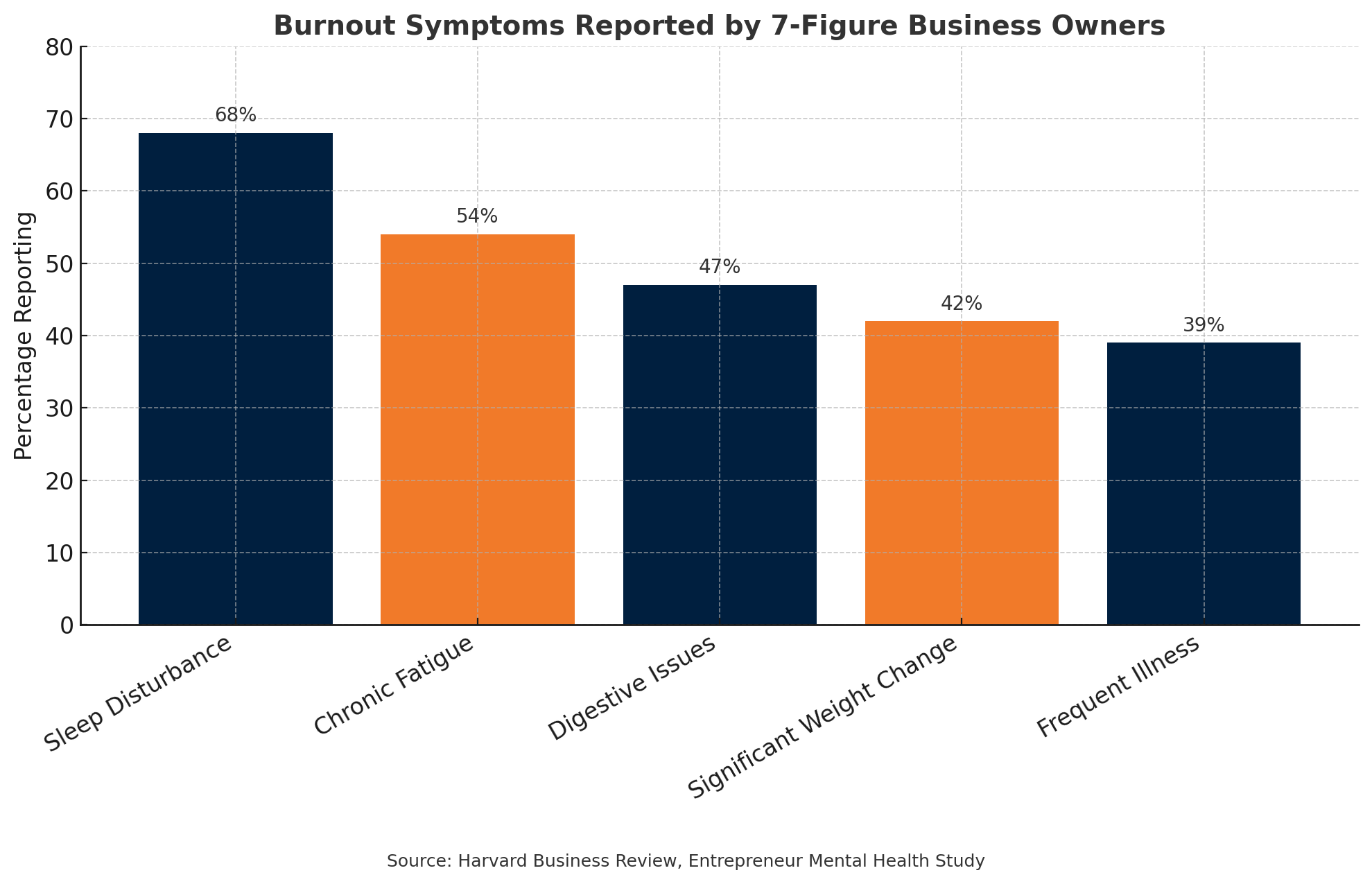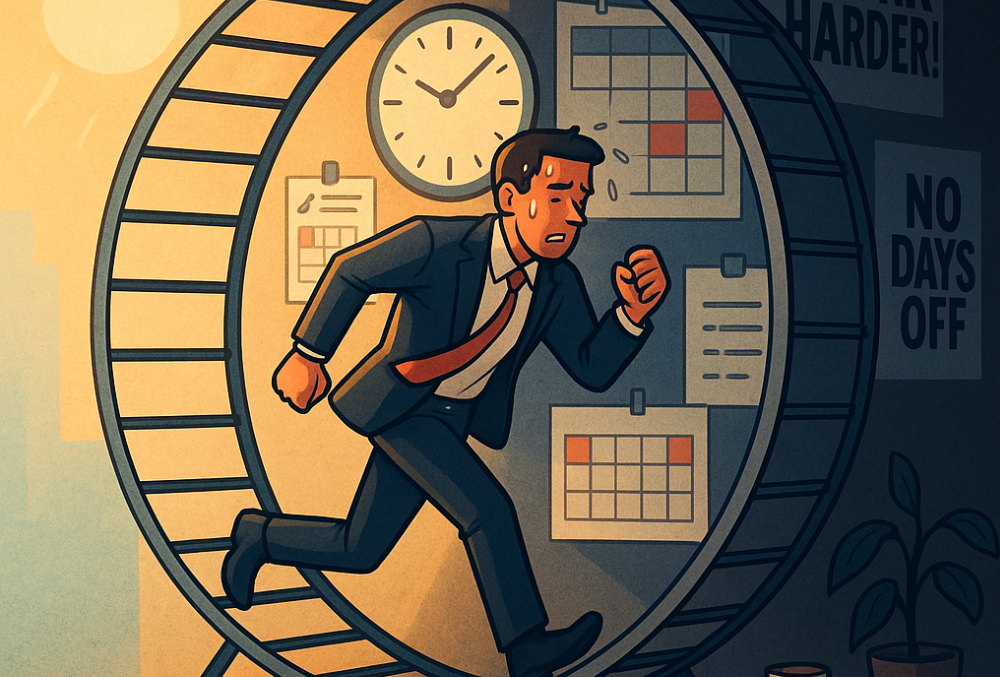The Success Paradox: Empty at the Top
Mark sat in his Tesla outside his 5,000 square foot home, unable to muster the energy to walk inside. Another 14-hour day complete. Revenue projections exceeded. Team expanded. Three new enterprise clients secured.
By every measurable metric, he was winning.
So why couldn’t he feel anything anymore?
This scene plays out daily across America’s entrepreneurial landscape. Men who’ve “made it” by society’s standards—breaking the 7-figure revenue ceiling, building impressive teams, receiving industry accolades—while internally running on fumes.
Burnout among high-achieving men isn’t just another business challenge. It’s a silent epidemic ravaging the minds, bodies, and relationships of those who appear to have everything figured out.
And unlike most business problems, this one rarely makes it into mastermind conversations or conference panels. Instead, it hides behind Instagram success posts, keynote speeches, and LinkedIn humble-brags.
This article pulls back the curtain on what’s really happening behind closed doors—and why addressing this epidemic matters not just for individual men, but for their families, businesses, and legacies.
| Burnout Behaviors | Breakthrough Behaviors |
|---|---|
| Always On | Strategic Disconnection |
| Hyper-Control | Delegated Trust |
| Isolation | Brotherhood |
| Revenue-Only Goals | Fulfillment Metrics |
| Perfectionism | Done is Better than Perfect |
The Scope of the Problem: Burnout by the Numbers
The statistics paint a sobering picture of entrepreneurial mental health:
- 34-35% of entrepreneurs experience burnout symptoms severe enough to impact their ability to function
- Over 50% report significant anxiety directly related to their business
- 31% struggle with work-life balance that consistently tips toward work
- 72% of entrepreneurs self-report mental health concerns
Perhaps most telling is this contradictory finding: while 75% of entrepreneurs claim to be “happy” when directly asked, nearly 88% report experiencing at least one mental health challenge related to their business.
The numbers worsen when focusing specifically on high-earning entrepreneurs. A Harvard Business Review study found that founders who surpass the million-dollar revenue mark experience a 26% increase in reported stress levels, despite their improved financial position.
Why the disconnect? The answer lies in the entrepreneurial culture itself. A staggering 89% of business owners believe there’s still a significant mental health stigma in business circles, making vulnerability about struggles nearly impossible.
“Everyone’s watching,” explained a 7-figure agency owner who requested anonymity. “Clients, employees, competitors, family—they all need you to be the unshakeable one. There’s no room to admit you’re drowning.”

Why 7-Figure Men Are Especially Vulnerable
Why 7-Figure Men Are Especially Vulnerable
The journey to 7-figures typically requires extraordinary drive, work ethic, and personal sacrifice. These same traits that build successful businesses often create perfect conditions for burnout.
The Relentless Drive
High-achieving entrepreneurs rarely celebrate wins. Instead, each milestone immediately becomes the new baseline, with the next target already in sight. This relentless growth orientation creates chronic stress with no recovery periods.
“I hit our annual revenue goal in Q3 last year,” said Jonathan, founder of a software company. “Instead of celebrating, I immediately revised the target upward. My team was excited, but I was already mapping the new challenge. I haven’t taken a real breath in years.”
The “Always On” Culture
Digital technology has erased the boundaries between work and life. For 7-figure business owners, this translates to:
- 82% checking business email before breakfast
- 73% handling work matters after 9pm
- 91% working in some capacity during supposed vacation time
“My phone is basically a part of my body,” admitted Carlos, who runs a 7-figure marketing firm. “My wife jokes that she’s in a polyamorous relationship with me and my iPhone—except she’s not really joking anymore.”
Unique Pressures at the Top
High-earning entrepreneurs face amplified stakes that most people never experience:
- Employee livelihoods depend on their decisions: The average 7-figure business supports 12-35 employees and their families
- Financial responsibilities expand with success: Bigger office leases, higher overhead, larger payroll obligations
- Isolation intensifies: Finding peers who truly understand becomes increasingly difficult
- The fall gets scarier: More success means more visibility when things go wrong
“The weight gets heavier, not lighter,” explained Michael, whose construction business crossed $3M in revenue last year. “Everyone thinks you’ve made it, but you’re just carrying more responsibility with less room for error.”
The Myth of “Having It All”
Perhaps most insidious is the expectation that financial success should equate to emotional fulfillment. When it doesn’t, many high-achieving men assume they’re doing something wrong, pushing harder into the very behaviors depleting them.
“I remember thinking—once we hit $1.5M, I’ll feel secure. Then it was $3M. Then $5M,” said David, co-founder of a successful tech startup. “I’ve moved the goalpost so many times I don’t even remember why I’m running anymore.”
The Silent Symptoms: How Burnout Manifests in High Achievers
Burnout in high-performing men often looks different than conventional descriptions, making it harder to identify and address.
Emotional Numbness and Purpose Drift
Rather than dramatic breakdowns, many report a gradual emptiness:
- Diminished enthusiasm for work that once energized them
- Emotional detachment from business wins and losses
- Inability to feel satisfaction from achievements
- Questioning the meaning and purpose of their work
“I landed our biggest client ever last month,” said Robert, whose consulting firm broke $2M last year. “Five years ago, I would have been ecstatic for weeks. Now I felt nothing—just checked it off and moved to the next problem.”
This “achievement hangover” represents burnout’s emotional signature in high-performers—success that no longer satisfies.
Physical Manifestations
The body keeps score when the mind tries to push through:
- 68% of high-earning entrepreneurs report sleep disturbances
- 54% experience persistent fatigue unrelieved by rest
- 47% report stress-related digestive issues
- 42% have experienced significant weight changes (gain or loss)
- 39% report increased illness frequency or lowered immunity
These physical symptoms often become the first undeniable signs that something is wrong, particularly when they begin affecting performance.
“I ended up in the ER thinking I was having a heart attack,” shared Alex, founder of a manufacturing business. “It was ‘just’ a panic attack, but my body was sending a message I couldn’t ignore anymore.”
Relationship Erosion
Perhaps the most painful cost comes in personal relationships:
- Emotional distance from spouse/partner despite physical presence
- Decreased patience and attention with children
- Withdrawal from friendships and social activities
- Communication reduced to logistics rather than connection
“My 9-year-old drew our family for a school project,” shared Thomas, CEO of a thriving financial services firm. “She drew me as a stick figure holding a phone with my back turned away from everyone else. That hit me harder than any revenue miss ever could.”
Real Voices from the Frontlines
The experiences of high-achieving men tell the real story:
“I have everything I thought I wanted, but I feel completely empty inside most days.” – E-commerce brand founder
“Nobody gets what I carry. Even my wife thinks I’m just working too much by choice.” – Marketing agency CEO
“I can’t remember the last time I felt truly rested or present. I’m operating at maybe 60% of my capacity but I can’t seem to recharge.” – SaaS company founder
“Sometimes I fantasize about my business burning to the ground just so I could start over differently.” – Manufacturing company owner
The High Cost of Ignoring Burnout
The impact of unaddressed burnout extends far beyond personal discomfort.
Business Impact
The numbers tell a stark story about burnout’s business consequences:
- 16% of small business failures cite owner burnout as a primary cause
- Decision-making quality decreases by up to 27% during periods of extreme stress
- Team turnover increases by 31% under burned-out leadership
- Innovation and creative problem-solving drop by 23%
“My burnout nearly tanked the company,” admitted Jordan, who founded a now-successful tech firm. “I was making reactive decisions, missing important details, and creating a toxic culture because I was running on empty. We lost three key team members before I realized I was the problem.”
Personal Toll
The health implications are equally concerning:
- 300% increased risk of heart disease in chronically stressed business owners
- 220% higher rates of anxiety and depression
- 180% increased likelihood of substance dependence
- 89% higher incidence of stress-related health conditions requiring medical intervention
“Success was killing me, literally,” said Daniel, who built a 7-figure construction company. “My doctor told me my internal markers looked like someone 20 years older. That was my wake-up call.”
The Domino Effect
Perhaps most concerning is how burnout creates cascading failures across all domains:
- Leadership effectiveness diminishes, impacting team performance
- Strategic thinking narrows, focusing only on short-term solutions
- Risk assessment abilities deteriorate
- Relationship damage accumulates at home
- Legacy building becomes impossible when merely surviving

Why Most 7-Figure Men Suffer in Silence
Despite these severe consequences, most high-achieving men remain silent about their struggle.
The “Strong Provider” Identity
Many successful men have internalized cultural expectations that strength means handling everything without complaint. Their identity formation often includes:
- Being the rock others depend on
- Solving problems, not becoming one
- Providing security for others at personal cost
- Leading through example, not vulnerability
“My father worked himself into an early grave building his business,” shared William, a successful retail chain owner. “He never complained once. I learned that’s what men do—we carry the load and keep moving.”
Lack of Safe Spaces
Even when men recognize their burnout, finding appropriate outlets proves challenging:
- 76% fear appearing weak to business partners or team members
- 68% worry about client perception if they admit struggles
- 64% don’t want to burden their spouse with business stress
- 57% believe no one would understand their specific situation
The result is a dangerous isolation where common struggles remain unspoken and unaddressed.
“I sit in rooms with other successful guys all the time,” said Marcus, whose software company generates over $5M annually. “We talk about growth strategies and market conditions, never about how we’re really doing. It’s like an unwritten rule.”
The Illusion of Happiness
Perhaps most perplexing is the self-deception many high-achieving men maintain:
- 75% claim to be “happy” when directly asked
- Yet 88% report at least one significant mental health challenge
- 64% acknowledge they’ve normalized a level of stress that would be unacceptable to others
- 59% admit to presenting a more positive public image than their reality
This cognitive dissonance—believing one is satisfied while experiencing clear distress symptoms—represents a psychological defense mechanism that prevents addressing the underlying problem.
Breaking the Cycle: What Actually Works
The path through burnout requires more than vacation time or better email management. True recovery demands fundamental shifts in how high-achieving men approach work, success, and identity.
The Power of Boundaries
Sustainable success requires clear delineation between business and life:
- Physical boundaries: Dedicated workspaces that can be left behind
- Temporal boundaries: Defined work hours with true disconnection periods
- Digital boundaries: Technology usage policies that protect presence
- Mental boundaries: Practices that allow “switching off” work mode
“I now have a strict 6pm cutoff for all business activities,” explained Anthony, whose consulting practice exceeds $2M annually. “My phone goes into a lockbox, and I don’t check email until 8am the next day. It felt impossible at first, but nothing has actually exploded.”
These boundaries aren’t signs of reduced commitment but rather strategic recovery practices that improve overall performance.
Delegation and Systems: From “Doer” to “Leader”
Many entrepreneurs remain stuck in operational roles long after they should transition to true leadership:
- 73% of 7-figure business owners still handle tasks that could be delegated
- 68% lack comprehensive systems documentation
- 57% serve as the primary decision-maker for matters that could be handled by others
“The hardest shift was from doing everything to leading others who do things differently than I would,” said Christopher, founder of a marketing agency. “But that transition saved me from complete burnout and allowed the business to grow beyond my personal capacity.”
Effective delegation requires:
- Systematic documentation of processes
- Trust-building with capable team members
- Comfort with “good enough” rather than perfection
- Clarifying outcomes while releasing control of methods
Brotherhood and Peer Support
Perhaps the most powerful antidote to burnout is breaking the isolation through authentic connection:
- Structured peer groups with confidentiality agreements
- Executive coaching relationships
- Mentorship connections (both giving and receiving)
- Non-business friendships that provide perspective
“My men’s group saved my life,” shared Samuel, whose real estate development firm generates $3.5M annually. “It’s the only place where I can completely drop the CEO mask and just be a human struggling with real stuff. Those men have seen me cry, and that vulnerability has made me stronger everywhere else.”
Professional Help: Beyond DIY Solutions
For many, professional support becomes essential:
- Executive coaching focused on sustainable performance
- Therapy addressing root causes rather than symptoms
- Health interventions targeting physical manifestations of stress
- Spiritual direction for meaning and purpose questions
“I resisted therapy for years because I thought it meant I was broken,” admitted Lawrence, CEO of a manufacturing firm. “When I finally went, I realized it was just another tool for optimization—like hiring a CFO or a fitness trainer. Now I consider it essential infrastructure for my success.”
7-figure entrepreneur burnout
From Burnout to Breakthrough: Stories of Transformation
Recovery from burnout often leads to more than restored energy—it creates transformation that enhances both life and business.
James: From Constant Hustle to Sustainable Growth
James built his digital marketing agency to $2.3M through non-stop work and personal sacrifice. After a panic attack during a client presentation, he realized something had to change.
“I was working 80+ hours weekly, missing my kids’ events, and still feeling like I wasn’t doing enough,” he recalled. “My wake-up call was when my 6-year-old asked my wife if I still lived with them because she rarely saw me.”
James implemented radical changes:
- Restructured his leadership team and truly delegated client relationships
- Created tech-free evenings and weekends
- Joined a peer advisory group specifically focused on work-life integration
- Invested in systems that reduced his operational involvement
The results surprised him. “Our company actually grew faster once I stepped back—up 37% the following year. But the real win was being present again with my family and remembering why I started the business in the first place.”
Michael: Redefining Success Beyond Revenue
Michael’s manufacturing business hit $4.2M, but his health was failing. Chronic insomnia, weight gain, and high blood pressure had become his constant companions.
“I kept thinking—once we hit the next revenue target, I’ll focus on my health,” he shared. “But that day never came because there was always another target.”
After his doctor warned him about serious health risks, Michael made fundamental changes:
- Redefined success metrics to include wellbeing measures
- Implemented a four-day workweek for himself
- Invested in executive health programming
- Built morning routines prioritizing physical and mental health
“I realized I was measuring success all wrong,” Michael explained. “Now we track revenue, but also my blood pressure, sleep quality, and time with family. The business is still growing, but I’m actually here to enjoy it now.”
David: From Isolation to Brotherhood
David built his technology consultancy to impressive financial success but found himself increasingly isolated.
“I had ‘business friends’ but no one I could really talk to about my struggles,” he recalled. “I was carrying everything alone and slowly drowning.”
His transformation began when he joined a structured men’s group with other high-achieving entrepreneurs:
- Weekly meetings focused on authentic connection
- Structured accountability for personal commitments
- Shared vulnerabilities without business agendas
- Guidance from those who’d navigated similar challenges
“Finding my brotherhood changed everything,” David shared. “These men helped me see my blind spots, challenged my workaholic tendencies, and reminded me that I’m more than what I produce. I’m a better leader, husband and father now because I’m not trying to be superhuman anymore.”
Is This You? Questions for Self-Reflection
Ask yourself honestly:
- When was the last time you felt genuinely energized by your work beyond a temporary adrenaline rush?
- How would your spouse or children describe your presence at home over the past month?
- Do you have confidants who know your real struggles, not just your business successes?
- What physical symptoms are you experiencing that might be stress-related?
- If your current pace continued for five more years, what would the cost be to your health, relationships, and joy?
- What would need to change for your success to feel truly sustainable and fulfilling?
Breaking the Silence: Your Next Steps
If this article resonates with your experience, consider:
- Start with honest acknowledgment: Recognizing burnout isn’t weakness—it’s awareness.
- Prioritize physical recalibration: Sleep, movement, and nutrition form the foundation of recovery.
- Find your brotherhood: Seek structured connection with peers who understand your challenges.
- Consider professional support: Executive coaching, therapy, or specialized programs can provide critical guidance.
- Redefine success metrics: Expand your definition beyond financial outcomes to include wellbeing and relationships.
The Brotherhood You’ve Been Looking For
At The Syndicate Council, we’ve created the environment high-achieving men need to thrive in all domains—business, family, health, and purpose.
Our structured brotherhood combines peer support, strategic guidance, and holistic wellbeing practices specifically designed for 7-figure entrepreneurs facing these exact challenges.
[Call to action about The Syndicate Council’s offering]
True Leadership: Thriving, Not Just Surviving
The silent epidemic of burnout among successful men represents more than individual suffering—it’s a systemic failure of how we’ve defined achievement.
True leadership isn’t demonstrated by working yourself into exhaustion. It’s shown through sustainable impact, present relationships, and the wisdom to build success that enhances life rather than depleting it.
The strongest move isn’t pushing through burnout—it’s having the courage to acknowledge it and chart a different path.
Your business deserves a leader who’s fully alive. Your family deserves a man who’s truly present. You deserve a life that feels as successful on the inside as it appears on the outside.
The question isn’t whether you can afford to address burnout. It’s whether you can afford not to.
Quick Tips for Burnout Prevention
- Morning Sanctuary: Create 30 minutes of technology-free time before engaging with business demands
- Strategic Recovery: Schedule short renewal breaks throughout your workday (5-10 minutes every 90 minutes)
- Delegation Audit: Identify three tasks this week you could entrust to someone else
- Connection Ritual: Establish one device-free family activity weekly
- Performance Boundaries: Set clear work hour limits and honor them as you would client commitments
- Brotherhood Building: Reach out to one peer this week for an honest conversation beyond business
🔥 Ready to Step Into the Room That Changes Everything?
You weren’t meant to lead alone. You weren’t made to carry the weight in silence.
There’s a reason you’re still searching—even with the success you’ve built.
This isn’t a seminar. It’s a mirror. A reset. A brotherhood.
Join 100 high-performing men—fathers, husbands, leaders—who are ready to trade surface-level success for deep-rooted significance.
At this event, you won’t just learn—you’ll confront, clarify, and come back home different.
📍 Laguna Beach | June 2025
2 Days. One Room. Zero Masks.
👉 Apply Now — Spots are limited and reserved for men ready to face the truth.
👉 Watch the Event Preview to see what’s waiting on the other side.
“Don’t wait for rock bottom. Draw the line. Get in the room.”
FAQ
Q: Isn’t some level of stress necessary for high performance?
A: Productive stress (eustress) can enhance performance, but chronic stress without recovery depletes performance. The key distinction is oscillation—moving between periods of challenge and recovery—rather than constant strain.
Q: Won’t slowing down hurt my business growth?
A: Research shows the opposite. Strategic disengagement improves decision-making, creativity, and leadership effectiveness. Many businesses actually accelerate growth when their founders create sustainable work patterns.
Q: How do I know if I’m experiencing burnout or just going through a challenging growth period?
A: Temporary stress during growth phases typically has identifiable endpoints and produces energy alongside fatigue. Burnout manifests as chronic depletion, emotional numbness, and questioning of meaning—with symptoms persisting regardless of circumstances.
Q: Can I recover from burnout without making major business changes?
A: Minor adjustments may provide temporary relief, but sustainable recovery typically requires structural changes to how you work, delegate, and define success. The good news is these changes often strengthen rather than compromise business performance.
Q: What if my industry or business model seems to demand constant availability?
A: Every industry has successful leaders who have created sustainable models. The question isn’t whether it’s possible but rather what specific boundaries, systems, and support structures you need to implement for your situation.





